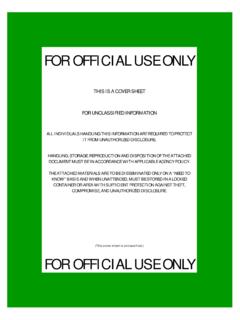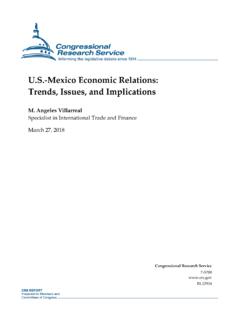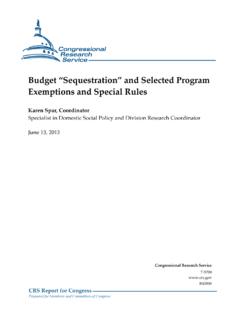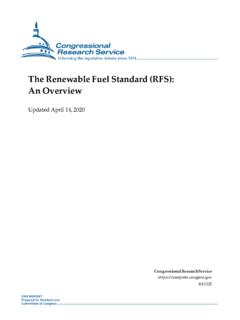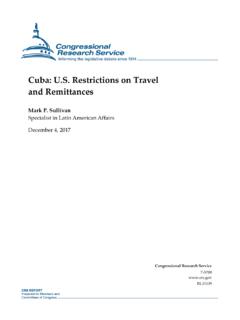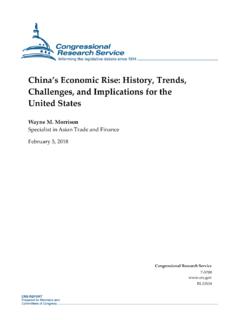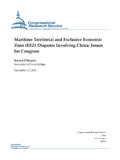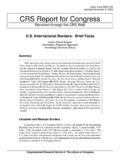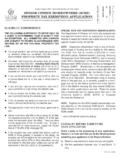Transcription of 'Amazon Laws' and Taxation of Internet Sales ...
1 amazon Laws and Taxation of Internet Sales : Constitutional Analysis Erika K. Lunder Legislative Attorney Carol A. Pettit Legislative Attorney April 9, 2015 Congressional Research Service 7-5700 R42629 amazon Laws and Taxation of Internet Sales : Constitutional Analysis Congressional Research Service Summary As more purchases are made over the Internet , states are looking for new ways to collect taxes on online Sales . There is a common misperception that the Constitution prohibits states from taxing Internet Sales . This is not true. States may impose Sales and use taxes on such transactions, even when the retailer is outside the state.
2 However, if the seller does not have a constitutionally sufficient connection ( nexus ) to the state, then the seller is under no enforceable obligation to collect the tax and remit it to the state. The purchaser is still generally responsible for paying the tax, but few comply and the tax revenue goes uncollected. Nexus is required by two provisions of the Constitution: the Fourteenth Amendment s Due Process Clause and the Commerce Clause. In the 1992 case Quill v. North Dakota, the Supreme Court held that the dormant Commerce Clause requires that a seller have a physical presence in a state before the state may impose tax collection obligations on it, while due process requires only that the seller have purposefully directed contact at the state s residents.
3 Notably, under its power to regulate commerce, Congress may choose a different standard than physical presence, so long as it is consistent with other provisions of the Constitution, including due process. Congress has not used this authority to provide a different standard, although legislation has been introduced in the 114th Congress (S. 698, Marketplace Fairness Act). In recent years, some states have enacted laws, often called amazon laws in reference to the Internet retailer, to try to capture uncollected taxes on Internet Sales and yet still comply with the Constitution s requirements.
4 States have used two basic approaches. The first is enacting click-through nexus statutes, which impose the responsibility for collecting tax on those retailers who compensate state residents for placing links on their websites to the retailer s website ( , use online referrals). The other is requiring remote sellers to provide information about Sales and taxes to the state and customers. New York was the first state to enact click-through nexus legislation, in 2008. In 2010, Colorado was the first to pass a notification law. amazon tax laws have received significant publicity, in part due to questions about their constitutionality and whether they impermissibly impose duties on remote sellers without a sufficient nexus to the state.
5 Both the New York and Colorado laws have been challenged on constitutional grounds. While the New York click-through nexus law was upheld by the state s highest court against facial challenges on due process and Commerce Clause grounds, Colorado s notification law was struck down by a federal district court as impermissible under the Commerce Clause for applying to sellers without a physical presence in the state and discriminating against out-of-state retailers. However, the Tenth Circuit Court of Appeals subsequently determined that federal courts do not have jurisdiction to hear the Colorado challenge due to the federal Tax Injunction Act.
6 In March 2015, the Supreme Court held in Direct Marketing Association v. Brohl that the Tax Injunction Act did not apply to this suit. However, the Court left open the possibility that the suit might be barred under the comity doctrine and instructed the Tenth Circuit to determine if the doctrine applied. Notably, Justice Kennedy wrote a concurrence in which he suggested that Quill was wrongly decided and should be reconsidered in light of technological advances and the development of the Internet . amazon Laws and Taxation of Internet Sales : Constitutional Analysis Congressional Research Service Contents Constitutional 2 Nexus.
7 2 Discriminatory Taxes .. 4 State amazon Laws .. 5 Click-Through Nexus .. 5 Required Notification .. 6 Constitutionality of amazon Laws .. 6 Constitutionality of New York s Click-Through Nexus Statute .. 6 Constitutionality of Colorado s Notification Requirements .. 8 Contacts Author Contact 10 Acknowledgments .. 10 amazon Laws and Taxation of Internet Sales : Constitutional Analysis Congressional Research Service 1 ecently, several states have enacted legislation intended to capture use taxes on Sales made by out-of-state sellers to in-state customers. These laws are commonly referred to as amazon laws, in reference to the Internet retailer.
8 A use tax is the companion to a Sales tax in general, the Sales tax is imposed on the sale of goods and services within the state s borders, while the use tax is imposed on purchases made by the state s residents from out-of-state (remote) The purpose of the use tax is to dissuade residents from purchasing goods and services from out-of-state merchants in order to avoid the Sales Two common misconceptions exist about the ability of states to impose Sales and use taxes on Internet Sales . The first is that the Internet Tax Freedom Act, enacted in 1998, prevents such This is not true.
9 The act contains a moratorium only on state and local governments imposing multiple or discriminatory taxes on electronic commerce, as well as new taxes on Internet access As a result of this law, a state may not, for example, impose a tax on electronic commerce that is not imposed on similar transactions made through other means (such as traditional brick and mortar stores).5 It remains permissible, however, for a state to impose a Sales or use tax that is administered equally without regard to whether the sale was face-to-face, mail order, or For more information on the act, see CRS Report R43800, Taxation of Internet Sales and Access: Legal Issues, by Erika K.
10 Lunder; CRS Report R43772, The Internet Tax Freedom Act: In Brief , by Jeffrey M. Stupak. The second misperception is that the Constitution prohibits states from taxing Internet Sales . States have the power to tax their residents who purchase goods or services on the Internet , even when the seller is located outside the state and has no real connection with it. However, if the seller does not have a constitutionally sufficient connection ( nexus ) to the state, then the seller is under no enforceable obligation to collect the tax and remit it to the state. In this situation, the purchaser is still generally responsible for paying the use tax, but few comply and the tax revenue goes uncollected.


